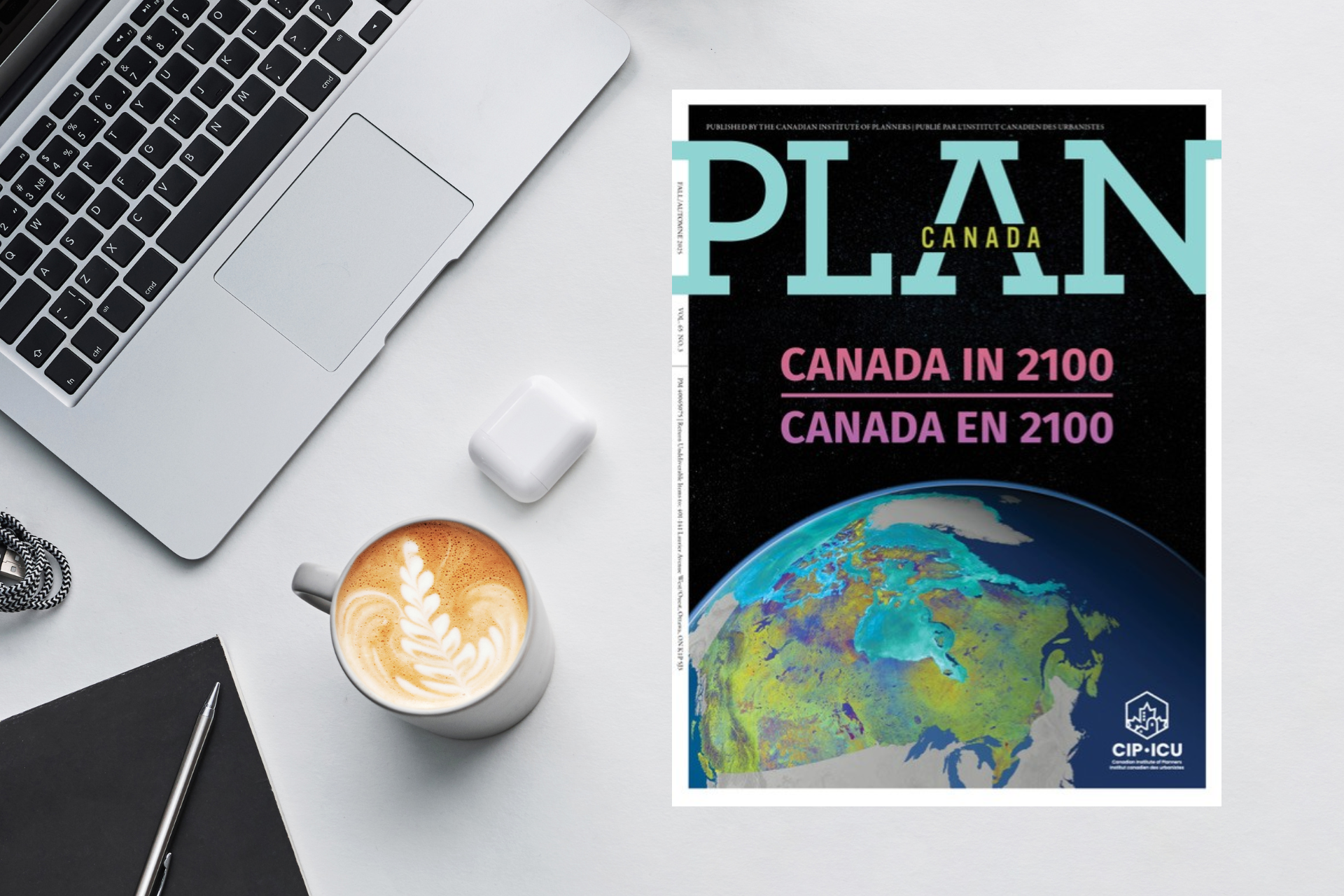Editor’s Note by Glenn Miller FCIP and Jennifer Dean PhD, RPP, MCIP
Searching for Better Ways to Plan for Our Future
Plan Canada is a critically important forum for the exploration of ideas and approaches to the enhancement of professional practice in Canada. This issue’s theme, Canada in 2100, challenges planners to imagine what kind of place Canada will be in 75 years. This prospective, futures-thinking exercise is both timely and relevant given the magnitude of current issues facing Canada and the planning profession. The call to consider a better way to plan for our future raises questions for which there are few easy answers.
Our theme for this issue of Plan Canada was inspired by the College of Fellows, who earlier this year published a report entitled Canada in 2100: A Bold Vision for Planning’s Role in Achieving Sustainable Prosperity. This paper has initiated a broader discussion that was featured in multiple sessions at the CIP/OPPI National Conference in July, and now the focus of this edition of Plan Canada. The College anticipates that Canada in 2100 will be a continuing discussion to stimulate new ideas from which Canada, and the planning profession, can benefit.
We are excited about the contribution that this edition of Plan Canada makes to the larger conversation about our future over the next 75 years. The authors have provided thoughtful and provocative articles that address today’s urgent problems with suggestions for how to plan for the long-term. These contributions offer prescriptions for thinking differently about the future as well as calls for action to satisfy planning’s ethical responsibilities.
The articles selected for this issue tap a remarkable breadth of experience, expertise and geographical perspectives. You will find viewpoints from planners starting out, insights from mid-career consultants, senior practitioners and academics. You will also ‘hear’ the voices of planners and nonplanners whose views benefit from decades of experience, as well as those willing to colour outside the lines of traditional practice. In short, this issue of Plan Canada represents a valuable contribution to the ongoing discussion initiated by the College to push our profession forward.
Our future is inevitably tied to Canada’s demographic trends, and the reality that Canada has long been reliant on immigration to achieve population and economic stability. Russell Mathew and Jaclyn Hall call our attention to the implications of unchecked growth in our existing large cities, highlighting the opportunity for small and medium-size cities to shine. Conversely, Max Hartt explores a future where parts of Canada will experience decline, as the country competes for immigrants in a globalizing world.
One constant theme in future thinking is the presence of uncertainty and change. Lisa Prime and Daniel Hoornweg identify three pillars to consider when planning for an uncertain future, with change ratcheting up the scale of challenges decade by decade. Mark Seasons and Larry Kotseff then reflect on their past attempts to look ahead, concluding that future generations of planners will need to be trained to be increasingly creative and responsive to change and uncertainty.
Our authors exhort us to be bolder as a profession: Sean Hertel, a mid-career consultant, teacher and mentor, challenges planners to set aside constraints and take more risks as we move nearer to 2100, while Molly Harris and Gordon Harris, from opposite ends of the career continuum, provide an intergenerational perspective and passionate call to action on climate change, underscoring our ethical responsibility to lead.
Thinking outside of the box is also a necessary part of planning for the future as highlighted by former PIBC president Emilie Adin who invites us along her recent tour of Singapore to illustrate the power of travel in opening us up to thinking differently. Similarly, researcher and former politician Richard Gilbert challenges us to think about a potentially controversial proposal to address housing affordability and growth in the future.
Our authors stretch our understanding of how we do planning, and encourage us to think about new practices and approaches in the future. Dan Leeming, Eric Turcotte and Diane Riley build a case for urban designers to expand their discipline to embrace macro-scale issues such as climate change and community cohesion, while Katherine Perrott and Robin Mazumder suggest that tapping into the world of neuroscience can strengthen the effectiveness of scenario planning. These are ideas worth exploring.
This issue concludes with a powerful commentary from co-chair of the College of Fellows, Paul Bedford, inviting all members of CIP to embrace the challenge issued by Canada in 2100 by working collaboratively to impact decisions that affect our profession, and Canada.
In this penultimate Plan Canada issue of 2025, we hope readers are inspired by authors’ meaningful contributions to the Canada in 2100 discussion and encourage you to join the conversation.
How to Read This Issue of Plan Canada
Are you a CIP member?
Not a CIP member?
About the Editors

Glenn Miller FCIP
Based in Toronto, Glenn Miller, FCIP is a senior associate with the Canadian Urban Institute, where until 2016 he provided planning advice to the private, public and non-profit sectors. He previously led the CUI’s award-winning education and research programs and ran the CUI’s internship program. Glenn is also the co-founder of Strategic Regional Research Alliance, an NGO seeking a better understanding of how to connect home with work. Glenn was founding editor of the Ontario Planning Journal (1986-2011) and contributes to a wide variety of publications, including Y Magazine, ReNew Canada and SPACING. He recently rejoined the Editorial Committee for Plan Canada. Glenn was Planner in Residence at the University of Waterloo’s School of Planning in 2012. He also taught at Ryerson University’s School of Urban and Regional Planning (now TMU), Seneca College and the George Brown Institute Without Boundaries. Glenn became a member of the College of Fellows in 2005.

Jennifer Dean, PhD, RPP, MCIP
Jennifer Dean is an Associate Professor in the School of Planning at the University of Waterloo, a Registered Professional Planner in Ontario and a Member of the Canadian Institute of Planners. Jennifer’s research broadly explores the relationship between local environments and human health, the impact of professional practice and place-based inititives on community wellbeing, and effective planning education for enhanced learning and practice.
